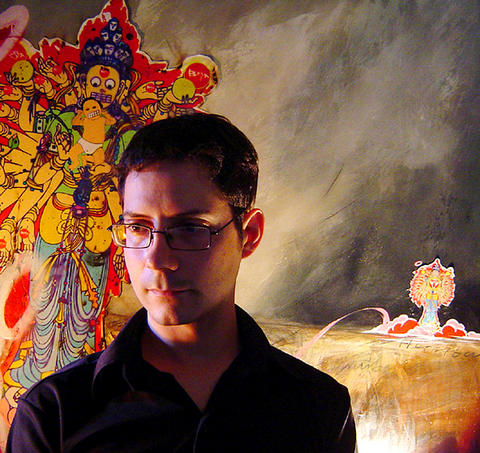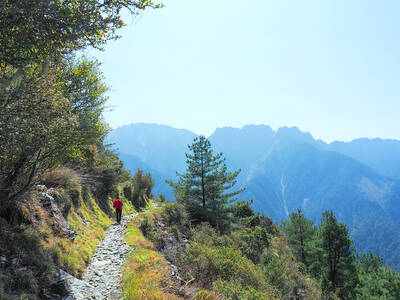With a collaborative remix electronica album available for free download, virtual weekly gigs on the Second Life Web site and a live set with hip-hop acts Kou Chou-ching (拷秋勤) , Chang Jui-Chuan (張睿銓) and Andre van Rensburg tomorrow, the Vinyl Word caught up with Taichung-based Moshang via e-mail to get the scoop on a very busy man.
Using traditional Chinese wind and string instruments such as the erhu (二胡), dizi (笛子, Chinese transverse flute), and pipa (琵琶), Moshang, 35, arranges his own street-sound recordings - which can be anything from conversations to processions - with music he records at home and other musicians' songs to produce his own special sound, which he calls "Chinese Chill."
"Turning found sounds, samples and loops into musical elements often requires painstaking editing ... similar to a jeweler cutting and polishing rough gemstones to fit a piece of jewelry," says Moshang.

PHOTO: COURTESY OF MOSHANG
Occasionally Moshang will create his own musical diamond. "By randomly connecting dots from ancient to present," he said. "I can sometimes cause a spark to fly between them and for the briefest transcendental moment the beats and notes align exactly right for something magical to be revealed."
Moshang's training began in South Africa as a choir boy. After that, he took up the saxophone and then finally broke into producing with an old Commodore Vic 20 computer. "Creating music is my greatest pleasure," he says, "so you'll mostly find me in my PC-based home-studio banging away at tunes ... working in a bit of a gray-area between downtempo electronica, jazz and world music."
Moshang's latest creation is Asian Variations. A remix "Chinese Chill" album featuring artists from all over the world such as Fort Minor, Viba, Chang, Kou and Van Rensburgthe. "I stripped away the drum tracks and replaced them with loops from my collection," Moshang said. "I also replaced most existing bass parts with ones I made myself."
Most of the artists on the album are unsigned. The Internet, although perceived by many as a great tool for putting out new music to a mass audience, also means that "with so many free singles, by so many artists, it is not necessarily easier to get heard," Moshang said. "Releasing an album makes it stand out from the crowd and provide a larger target for lightning to strike."
Moshang anticipates that playing with Kou and Chang tomorrow will be a real pleasure. They "are pretty unique in that they are rapping about socially relevant issues. Their style reminds me of some really old stuff ... like A Tribe Called Quest. Jui-Chuan is a true original. The only genuine scholar-rapper I know of [doing] hard-hitting, edgy hip-hop on Taiwanese and world political issues in Mandarin."
Moshang will make a presentation on his remixes and collaborations in Taipei on Jan. 19th at the Creative Commons workshop (see meeting.creativecommons.org.tw for more details) and will be playing at the Riverside Cafe (河岸留言) located at B1, 2, Ln 244, Roosevelt Rd, Sec 3, Taipei City (台北市羅斯福路三段244巷2號B1) in the evening. For more information, see www.riverside.com.tw
To download Asian Variations or request a free CD, visit www.asianvariations.com and to find out more about Moshang's other work visit moshang.net.

June 9 to June 15 A photo of two men riding trendy high-wheel Penny-Farthing bicycles past a Qing Dynasty gate aptly captures the essence of Taipei in 1897 — a newly colonized city on the cusp of great change. The Japanese began making significant modifications to the cityscape in 1899, tearing down Qing-era structures, widening boulevards and installing Western-style infrastructure and buildings. The photographer, Minosuke Imamura, only spent a year in Taiwan as a cartographer for the governor-general’s office, but he left behind a treasure trove of 130 images showing life at the onset of Japanese rule, spanning July 1897 to

In an interview posted online by United Daily News (UDN) on May 26, current Chinese Nationalist Party (KMT) Chairman Eric Chu (朱立倫) was asked about Taichung Mayor Lu Shiow-yen (盧秀燕) replacing him as party chair. Though not yet officially running, by the customs of Taiwan politics, Lu has been signalling she is both running for party chair and to be the party’s 2028 presidential candidate. She told an international media outlet that she was considering a run. She also gave a speech in Keelung on national priorities and foreign affairs. For details, see the May 23 edition of this column,

One of the most important gripes that Taiwanese have about the Democratic Progressive Party (DPP) is that it has failed to deliver concretely on higher wages, housing prices and other bread-and-butter issues. The parallel complaint is that the DPP cares only about glamor issues, such as removing markers of Chinese Nationalist Party (KMT) colonialism by renaming them, or what the KMT codes as “de-Sinification.” Once again, as a critical election looms, the DPP is presenting evidence for that charge. The KMT was quick to jump on the recent proposal of the Ministry of the Interior (MOI) to rename roads that symbolize

Jade Mountain (玉山) — Taiwan’s highest peak — is the ultimate goal for those attempting a through-hike of the Mountains to Sea National Greenway (山海圳國家綠道), and that’s precisely where we’re headed in this final installment of a quartet of articles covering the Greenway. Picking up the trail at the Tsou tribal villages of Dabang and Tefuye, it’s worth stocking up on provisions before setting off, since — aside from the scant offerings available on the mountain’s Dongpu Lodge (東埔山莊) and Paiyun Lodge’s (排雲山莊) meal service — there’s nowhere to get food from here on out. TEFUYE HISTORIC TRAIL The journey recommences with